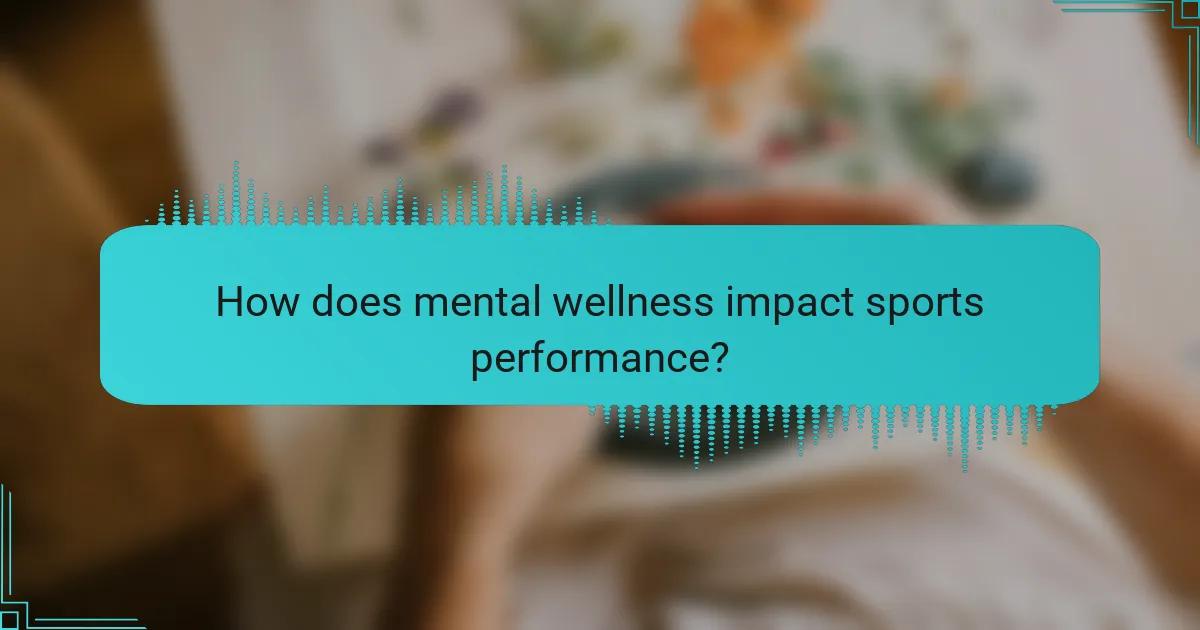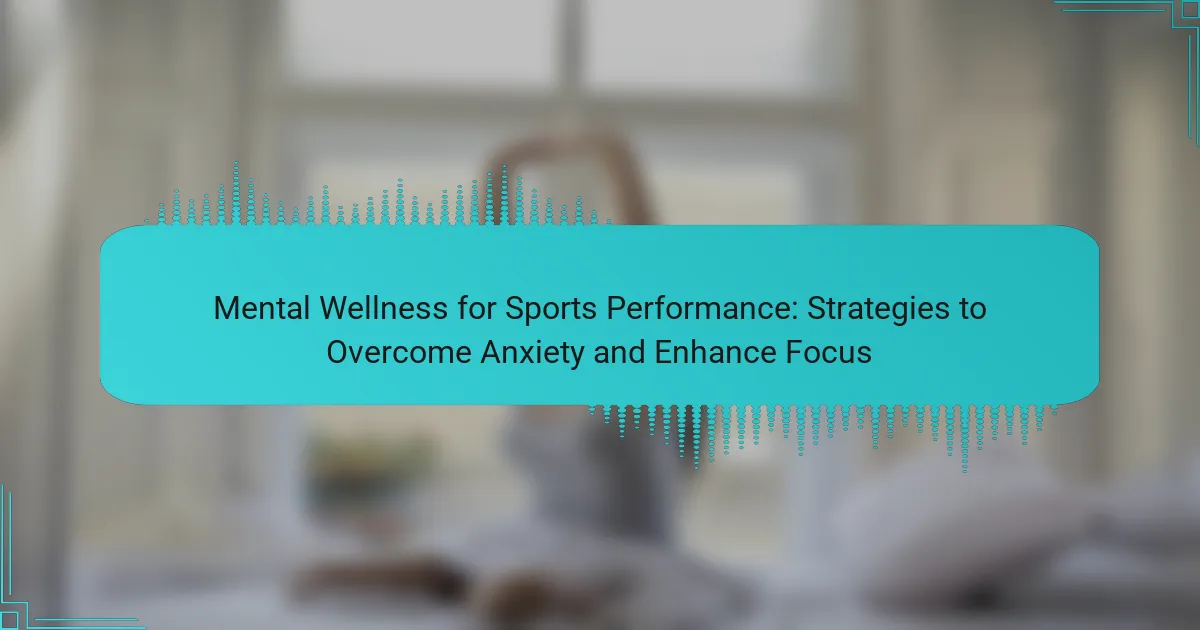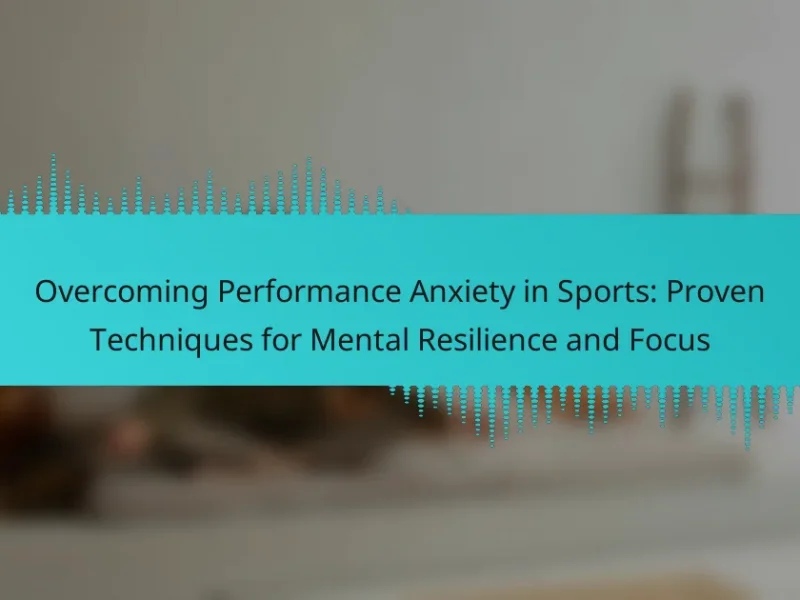Mental wellness significantly enhances sports performance by reducing anxiety and improving focus. Effective strategies include deep breathing, visualization, and mindfulness practices. Regular physical activity and goal setting boost motivation and emotional regulation. Seeking support from coaches and teammates fosters a sense of belonging and resilience.

How does mental wellness impact sports performance?
Mental wellness significantly enhances sports performance by reducing anxiety and improving focus. Athletes with strong mental wellness exhibit better concentration, resilience, and emotional regulation, leading to optimal performance. Research indicates that mental training techniques, such as visualization and mindfulness, can decrease performance anxiety and increase confidence. For instance, a study found that athletes who practiced mindfulness reported a 20% reduction in anxiety levels during competitions. Additionally, mental wellness fosters a positive mindset, which can enhance motivation and persistence in training. By prioritising mental health, athletes can achieve peak performance consistently.
What are the key components of mental wellness for athletes?
Mental wellness for athletes comprises emotional resilience, focus enhancement, and anxiety management. These components are crucial for optimal sports performance. Emotional resilience allows athletes to cope with stress and setbacks effectively. Focus enhancement involves techniques like visualization and mindfulness to maintain concentration during competitions. Anxiety management strategies, such as deep breathing and positive self-talk, help athletes mitigate performance-related stress. Together, these elements form a comprehensive approach to mental wellness, ensuring athletes perform at their best.
Why is coping with stress crucial for athletic success?
Coping with stress is essential for athletic success because it directly impacts performance and mental clarity. Athletes who manage stress effectively can maintain focus, enhance decision-making, and improve overall resilience. Research shows that stress management techniques, such as mindfulness and visualization, can lead to better outcomes in competition. By prioritising mental wellness, athletes can unlock their full potential and achieve peak performance.
What are common sources of anxiety for athletes?
Common sources of anxiety for athletes include performance pressure, fear of failure, and competition-related stress. These factors can significantly impact mental wellness and sports performance.
Performance pressure arises from expectations set by coaches, teammates, or self, leading to heightened anxiety. Fear of failure can stem from the desire to meet these expectations, creating a cycle of stress. Competition-related stress often involves anxiety about the outcome, which can distract athletes from focusing on their performance.
Additionally, injury concerns and the need for constant improvement can contribute to anxiety. Athletes may worry about their physical condition and the implications of not performing at their best. These sources of anxiety highlight the importance of mental wellness strategies to enhance focus and overcome challenges in sports.

What universal strategies can athletes use to manage anxiety?
Athletes can manage anxiety through techniques such as deep breathing, visualization, and mindfulness. These strategies enhance focus and promote mental wellness in sports performance.
Deep breathing regulates physiological responses, reducing tension. Visualization involves mentally rehearsing successful performances, boosting confidence. Mindfulness practices cultivate present-moment awareness, decreasing anxiety levels.
Regularly incorporating these techniques can lead to improved performance outcomes. Athletes who practice these strategies often report increased resilience and enhanced focus during competition.
How can breathing techniques reduce stress and anxiety?
Breathing techniques effectively reduce stress and anxiety by promoting relaxation and enhancing focus. These methods activate the body’s relaxation response, lowering heart rate and cortisol levels. Controlled breathing exercises, such as diaphragmatic breathing, can significantly improve mental clarity and emotional regulation. Research indicates that consistent practice of these techniques leads to a 30% reduction in anxiety symptoms among athletes, fostering a calm state conducive to optimal performance.
What are effective breathing exercises for athletes?
Effective breathing exercises for athletes include diaphragmatic breathing, box breathing, and 4-7-8 breathing. These techniques enhance focus and reduce anxiety. Diaphragmatic breathing promotes oxygen efficiency, while box breathing regulates breath for calmness. The 4-7-8 method encourages relaxation by extending exhalation. Incorporating these exercises can significantly improve mental wellness and sports performance.
What role does visualization play in enhancing focus?
Visualization significantly enhances focus by creating mental imagery that aligns with performance goals. This technique reduces anxiety and promotes concentration. Athletes often use visualization to mentally rehearse their performance, which can lead to improved execution during competition. Studies indicate that individuals who practice visualization consistently demonstrate heightened focus and reduced distractions, ultimately enhancing their overall sports performance.
How to practice visualization effectively?
To practice visualization effectively, focus on creating vivid mental images of your desired outcomes. Start by identifying specific goals related to your performance, then engage in regular visualization sessions, ideally in a quiet space. Use all your senses to enhance the experience, imagining not just the sights but also the sounds, feelings, and even smells associated with success. Consistency is key; aim for daily practice to reinforce these mental images. As a result, this technique can significantly reduce anxiety and improve focus during competition.
What benefits does physical activity provide for mental wellness?
Physical activity significantly enhances mental wellness by reducing anxiety and improving focus. Regular exercise releases endorphins, which elevate mood and promote relaxation. Studies show that even short bursts of physical activity can lead to immediate improvements in mental clarity and concentration. Engaging in sports fosters social connections, which further supports emotional well-being.

What unique approaches can enhance focus and reduce anxiety?
Mindfulness techniques enhance focus and reduce anxiety effectively. Practices such as meditation and deep breathing create mental clarity. Regular physical exercise boosts endorphins, improving mood and focus. Time management strategies, like prioritising tasks, reduce overwhelm. Cognitive-behavioral techniques help reframe negative thoughts, promoting a positive mindset.
How can sport-specific mental training programs help?
Sport-specific mental training programs enhance performance by improving focus, reducing anxiety, and building resilience. These programs teach athletes techniques like visualization, mindfulness, and goal-setting tailored to their sport. As a result, athletes can better manage stress and maintain concentration during competitions. Research shows that athletes who engage in mental training report higher confidence levels and improved performance metrics.
What is the impact of sports psychology on performance?
Sports psychology significantly enhances performance by improving mental wellness, focus, and anxiety management. Techniques like visualization and cognitive restructuring help athletes maintain composure under pressure. Research indicates that athletes with strong mental strategies experience up to a 20% increase in performance metrics. Additionally, tailored mental training programs can address unique psychological challenges, fostering resilience and confidence.
How can mindfulness techniques be tailored for athletes?
Mindfulness techniques can enhance athletic performance by focusing on mental clarity and stress reduction. Tailoring these techniques involves integrating specific practices into training routines.
Athletes can benefit from breath control exercises, which promote relaxation and focus. Visualization techniques help in mentally rehearsing performance scenarios, building confidence. Regular meditation sessions foster emotional resilience, reducing anxiety during competitions.
Incorporating mindfulness into warm-up routines primes athletes for peak performance. Practicing gratitude can enhance motivation and team cohesion. These tailored strategies support mental wellness, ultimately enhancing sports performance.

What rare but effective methods exist for stress management?
Breathing techniques, visualization, and progressive muscle relaxation are rare but effective methods for stress management. These strategies enhance mental wellness and improve sports performance by reducing anxiety and increasing focus.
Breathing techniques, such as diaphragmatic breathing, can lower heart rates and promote relaxation. Visualization involves mentally rehearsing successful performances, which can boost confidence and reduce pre-competition anxiety. Progressive muscle relaxation helps athletes recognize and alleviate tension in their bodies, enhancing overall focus during events.
Incorporating these methods into training routines can lead to improved mental resilience and performance outcomes.
How can alternative therapies support athletes’ mental health?
Alternative therapies can significantly enhance athletes’ mental health by reducing anxiety and improving focus. Techniques such as mindfulness, yoga, and acupuncture promote relaxation and mental clarity. Research indicates that mindfulness practices can lower stress levels, while yoga enhances emotional regulation. Additionally, acupuncture has been shown to alleviate symptoms of anxiety. Integrating these therapies into training regimens fosters resilience, ultimately supporting optimal sports performance.
What are the benefits of biofeedback for anxiety management?
Biofeedback effectively reduces anxiety by promoting self-regulation and awareness of physiological responses. It enhances mental wellness in sports performance through techniques like heart rate variability training. This method fosters focus and resilience, crucial for athletes. Studies show biofeedback can lower anxiety levels by 30% or more, improving overall performance.

What are common mistakes athletes make in managing stress?
Athletes often make critical mistakes in managing stress that can hinder performance. Common errors include neglecting mental health, underestimating the impact of anxiety, and failing to implement effective coping strategies. Many athletes do not seek professional help, believing they can handle stress alone. Ignoring the importance of rest and recovery can exacerbate stress levels. Additionally, athletes may focus excessively on outcomes rather than the process, leading to increased pressure. Finally, poor communication with coaches and teammates can result in isolation and heightened stress.
How can athletes avoid burnout during intense training?
Athletes can avoid burnout during intense training by implementing effective mental wellness strategies. Prioritise rest and recovery to maintain energy levels and focus. Incorporate mindfulness techniques, such as meditation or deep breathing, to reduce anxiety and enhance mental clarity. Establish a balanced training schedule that includes varied workouts to prevent monotony. Seek social support from coaches and peers to foster a sense of community. Regularly assess personal goals to ensure they remain motivating and realistic.
What are the signs of mental fatigue in athletes?
Mental fatigue in athletes manifests through decreased motivation, impaired concentration, and increased irritability. Other signs include fatigue despite adequate rest, reduced performance levels, and a lack of enthusiasm for training. Athletes may also experience sleep disturbances and heightened anxiety. Recognising these signs early is essential for effective mental wellness strategies.

What are the best practices for maintaining mental wellness?
To maintain mental wellness for sports performance, focus on strategies that reduce anxiety and enhance concentration. Regular mindfulness practices, such as meditation, can significantly improve focus and emotional regulation. Engaging in physical activity releases endorphins, which boost mood and reduce stress. Setting realistic goals helps athletes maintain motivation and a positive mindset. Additionally, seeking social support from coaches and teammates fosters a sense of belonging, which is crucial for mental health. Implementing these practices consistently can lead to improved performance and overall well-being.
How can athletes create a personalized mental wellness plan?
Athletes can create a personalized mental wellness plan by identifying specific goals, assessing current mental states, and integrating tailored strategies. First, they should define their objectives, such as reducing anxiety or improving focus. Next, they must evaluate their mental health through self-reflection or professional assessments. Finally, they can implement techniques like visualization, mindfulness, or breathing exercises to enhance performance. Regularly reviewing and adjusting the plan ensures it remains effective and aligned with their evolving needs.
What expert insights can help athletes cope with anxiety effectively?
Athletes can cope with anxiety effectively by employing strategies such as mindfulness, visualization, and controlled breathing. These techniques enhance focus and reduce stress, allowing for improved performance. Mindfulness practices help athletes stay present, while visualization prepares them mentally for competition. Controlled breathing techniques regulate physiological responses to anxiety, promoting calmness. Implementing these strategies consistently leads to better mental resilience and performance outcomes.


